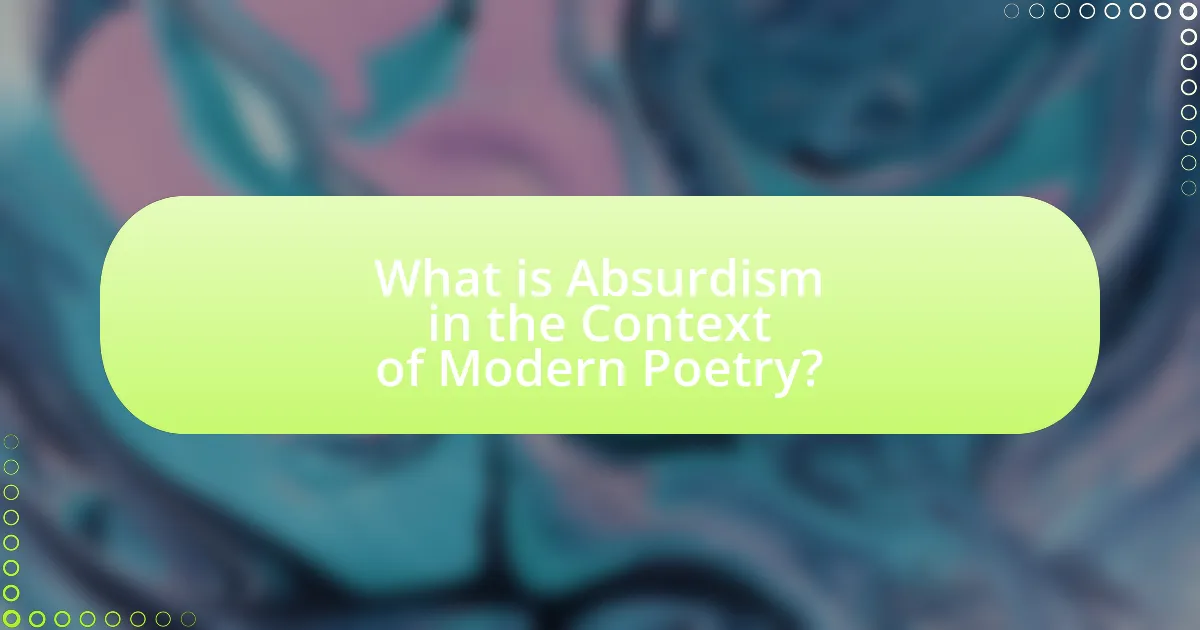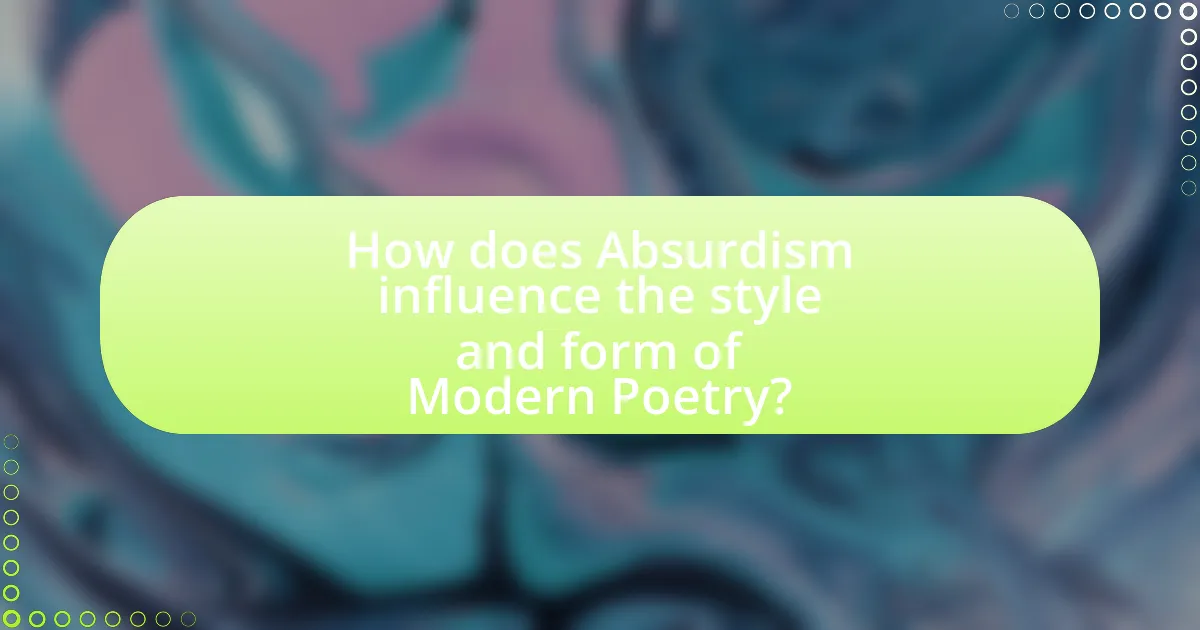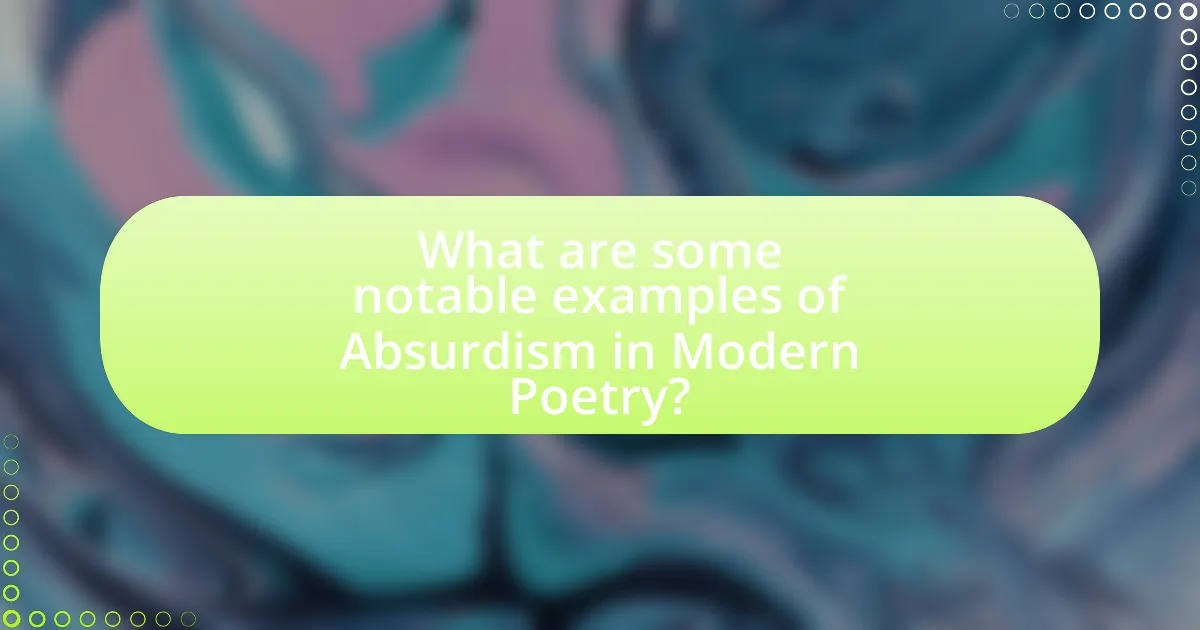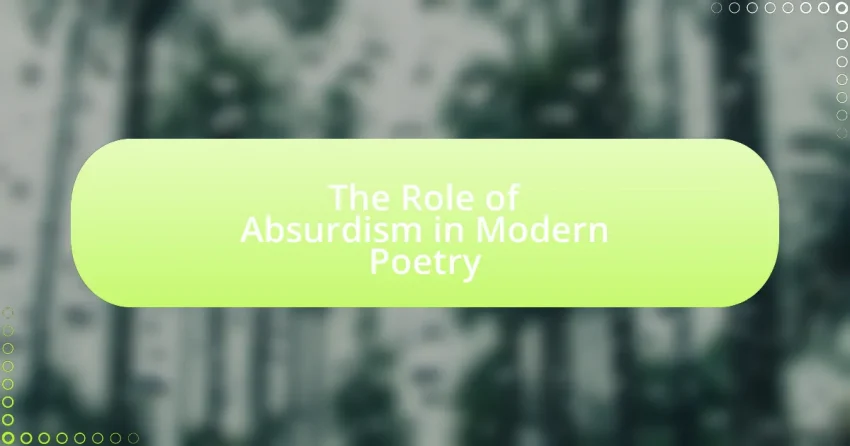Absurdism in modern poetry is a philosophical perspective that highlights the inherent meaninglessness of life and the human struggle for purpose, as seen in the works of poets like Samuel Beckett and T.S. Eliot. This article explores the emergence of Absurdism as a literary movement in the early 20th century, influenced by existential philosophy and historical events such as World War II. Key figures associated with Absurdism, core principles, prevalent themes, and stylistic elements in poetry are examined, along with notable examples and the impact of Absurdism on contemporary poetry. The discussion also addresses ongoing conversations about Absurdism’s relevance today and the insights gained from studying this movement in modern poetic contexts.

What is Absurdism in the Context of Modern Poetry?
Absurdism in the context of modern poetry refers to a philosophical perspective that emphasizes the inherent meaninglessness of life and the human struggle to find purpose. This concept is often reflected in the works of poets who explore themes of existential despair, disillusionment, and the absurdity of human existence. Notable poets such as Samuel Beckett and T.S. Eliot incorporate absurdist elements, using fragmented narratives and unconventional structures to convey the chaotic nature of reality. The influence of absurdism is evident in the way modern poetry challenges traditional forms and embraces ambiguity, reflecting the complexities of contemporary life.
How did Absurdism emerge as a literary movement?
Absurdism emerged as a literary movement in the early 20th century, primarily influenced by the existential philosophy of thinkers like Albert Camus and Jean-Paul Sartre. This movement arose in response to the disillusionment following World War I, reflecting the belief that human existence is inherently meaningless and chaotic. The publication of Camus’s essay “The Myth of Sisyphus” in 1942 and the subsequent works of playwrights such as Samuel Beckett and Eugène Ionesco solidified Absurdism’s presence in literature. These authors utilized absurdity to explore themes of alienation, the futility of life, and the struggle for meaning, thereby establishing Absurdism as a significant literary and philosophical movement.
What historical events influenced the rise of Absurdism?
The rise of Absurdism was significantly influenced by the aftermath of World War II, particularly the existential crises and disillusionment that followed the war. The devastation and moral ambiguity of the conflict led thinkers like Albert Camus and Samuel Beckett to explore themes of meaninglessness and the human condition in their works. Additionally, the rise of existential philosophy, particularly the ideas of Jean-Paul Sartre, contributed to the development of Absurdism by questioning traditional values and the search for inherent meaning in life. These historical contexts provided a fertile ground for Absurdist literature, reflecting the chaotic and often irrational nature of human existence in a post-war world.
Who are the key figures associated with Absurdism in literature?
The key figures associated with Absurdism in literature include Albert Camus, Samuel Beckett, and Eugène Ionesco. Albert Camus is renowned for his philosophical essays and novels, particularly “The Stranger” and “The Myth of Sisyphus,” which explore the human condition and the search for meaning in a chaotic world. Samuel Beckett is best known for his play “Waiting for Godot,” which exemplifies Absurdist themes through its portrayal of existential uncertainty and the futility of human action. Eugène Ionesco, a prominent playwright, contributed significantly to Absurdism with works like “The Bald Soprano,” which highlights the breakdown of communication and the absurdity of everyday life. These authors collectively shaped the Absurdist movement, emphasizing the inherent meaninglessness of existence and the struggle to find purpose.
What are the core principles of Absurdism?
The core principles of Absurdism include the belief that human beings exist in a purposeless, chaotic universe, leading to a conflict between the desire for meaning and the indifferent nature of the world. This philosophy, articulated by thinkers like Albert Camus, emphasizes the futility of seeking inherent meaning in life, suggesting instead that individuals must create their own meaning despite the absurdity. Camus’ essay “The Myth of Sisyphus” illustrates this by depicting Sisyphus as a symbol of human perseverance in the face of absurdity, ultimately finding value in the struggle itself.
How does Absurdism define the human condition?
Absurdism defines the human condition as a conflict between the human desire for meaning and the indifferent universe that offers none. This philosophical perspective, articulated by thinkers like Albert Camus, emphasizes the inherent lack of purpose in life, leading individuals to confront the absurdity of existence. Camus’ essay “The Myth of Sisyphus” illustrates this by depicting Sisyphus as a symbol of human struggle, eternally pushing a boulder uphill only for it to roll back down, representing the futile search for meaning. Thus, Absurdism posits that while life may lack inherent meaning, individuals can find personal significance through their experiences and choices.
What themes are prevalent in Absurdist poetry?
Prevalent themes in Absurdist poetry include the meaninglessness of life, the conflict between human desire for purpose and the indifferent universe, and the exploration of existential despair. These themes reflect the Absurdist belief that human existence is inherently chaotic and devoid of inherent meaning, as articulated by key figures like Albert Camus and Samuel Beckett. For instance, Camus’ essay “The Myth of Sisyphus” illustrates the struggle against the absurdity of life, emphasizing the futility of seeking meaning in a meaningless world. This thematic focus on existential questions and the absurdity of the human condition is central to the genre, influencing modern poetry’s exploration of similar existential dilemmas.

How does Absurdism influence the style and form of Modern Poetry?
Absurdism significantly influences the style and form of Modern Poetry by emphasizing themes of existentialism, chaos, and the inherent meaninglessness of life. This philosophical perspective leads poets to adopt fragmented structures, unconventional syntax, and a focus on absurd imagery, reflecting the disordered nature of human experience. For instance, poets like Samuel Beckett and E.E. Cummings utilize disjointed narratives and playful language to convey the absurdity of existence, challenging traditional poetic forms and conventions. The impact of Absurdism is evident in the way these poets prioritize emotional resonance over logical coherence, creating works that resonate with the complexities of modern life.
What stylistic elements are characteristic of Absurdist poetry?
Absurdist poetry is characterized by stylistic elements such as illogical narratives, fragmented structures, and nonsensical language. These elements reflect the theme of existential absurdity, where traditional logic and meaning are subverted. For instance, poets like Samuel Beckett and Eugène Ionesco employ disjointed dialogue and surreal imagery to convey the futility of human existence. The use of paradox and irony further emphasizes the absurdity of life, as seen in works that challenge conventional poetic forms and expectations. This approach aligns with the philosophical underpinnings of Absurdism, which argue that human efforts to find inherent meaning are ultimately futile.
How do absurdist techniques challenge traditional poetic forms?
Absurdist techniques challenge traditional poetic forms by subverting conventional structures and meanings, often employing disjointed narratives, illogical sequences, and nonsensical language. These techniques disrupt the expectations of coherence and emotional resonance typically found in traditional poetry, as seen in the works of poets like Samuel Beckett and Eugène Ionesco, who utilize absurdity to reflect the chaos of human existence. By doing so, absurdist poetry emphasizes the futility of seeking meaning in a seemingly indifferent universe, thereby redefining the purpose and function of poetry itself.
What role does language play in Absurdist poetry?
Language in Absurdist poetry serves to highlight the inherent meaninglessness of existence and the limitations of communication. Through the use of nonsensical phrases, fragmented syntax, and paradoxical statements, Absurdist poets like Samuel Beckett and Eugène Ionesco illustrate the futility of language in conveying truth or understanding. This approach reflects the philosophical underpinnings of Absurdism, which posits that human attempts to find meaning are ultimately in vain. The deliberate distortion of language in works such as Beckett’s “Waiting for Godot” emphasizes the absurdity of the human condition, reinforcing the idea that language can often obscure rather than clarify reality.
In what ways does Absurdism affect the emotional tone of poetry?
Absurdism profoundly influences the emotional tone of poetry by introducing themes of existential despair, irony, and the search for meaning in a chaotic world. This philosophical perspective often leads poets to express feelings of alienation and disillusionment, as seen in the works of writers like Samuel Beckett and Eugène Ionesco, who highlight the absurdity of human existence. The emotional tone in such poetry frequently oscillates between humor and tragedy, reflecting the paradox of finding joy amidst despair. For instance, the juxtaposition of absurd situations with serious themes creates a complex emotional landscape that resonates with readers, emphasizing the futility of seeking definitive answers in life. This duality is evident in the use of stark imagery and unconventional structures, which further amplify the emotional impact of the poetry.
How do poets convey feelings of alienation and despair?
Poets convey feelings of alienation and despair through the use of vivid imagery, fragmented narratives, and existential themes. These techniques illustrate the disconnection individuals feel in a chaotic world, often reflecting the absurdity of existence. For example, T.S. Eliot’s “The Love Song of J. Alfred Prufrock” employs stream-of-consciousness and introspective monologue to express the protagonist’s isolation and anxiety, effectively capturing the essence of despair. Additionally, Samuel Beckett’s works often highlight the futility of communication and the struggle for meaning, reinforcing the sense of alienation inherent in the human experience. Such literary devices serve to evoke emotional responses, allowing readers to resonate with the profound sense of dislocation and hopelessness that defines modern poetry influenced by absurdism.
What contrasts exist between Absurdist poetry and other modern poetic movements?
Absurdist poetry fundamentally contrasts with other modern poetic movements through its emphasis on the inherent meaninglessness of life and the human condition. While movements like Romanticism focus on emotion and nature, and Modernism often seeks to find meaning through fragmented narratives and innovative forms, Absurdist poetry embraces chaos and irrationality, reflecting the belief that human efforts to find meaning are ultimately futile. This is evident in the works of poets such as Samuel Beckett and Eugène Ionesco, who utilize disjointed language and illogical scenarios to convey the absurdity of existence, diverging sharply from the structured approaches of their contemporaries.

What are some notable examples of Absurdism in Modern Poetry?
Notable examples of Absurdism in Modern Poetry include works by poets such as Samuel Beckett, whose poem “What Is the Word” exemplifies the themes of existential despair and the search for meaning in a chaotic world. Another significant example is the poetry of Wallace Stevens, particularly in “The Emperor of Ice-Cream,” which reflects the absurdity of life and the inevitability of death. Additionally, the works of John Ashbery, especially “Self-Portrait in a Convex Mirror,” showcase the fragmented nature of reality and the absurdity of human experience. These poets effectively illustrate Absurdism through their exploration of existential themes, highlighting the disconnection between human desires and the indifferent universe.
Who are the prominent poets known for their Absurdist works?
Prominent poets known for their Absurdist works include Samuel Beckett, who is renowned for his play “Waiting for Godot,” which exemplifies Absurdist themes. Another significant figure is Eugène Ionesco, whose poem “The Bald Soprano” reflects the nonsensical nature of communication. Additionally, Wallace Stevens incorporates Absurdist elements in his poetry, exploring the complexities of reality and perception. These poets are recognized for their contributions to Absurdism, which challenges conventional narratives and highlights the inherent meaninglessness of existence.
What specific poems exemplify Absurdist themes and styles?
Specific poems that exemplify Absurdist themes and styles include “The Waste Land” by T.S. Eliot, “Waiting for Godot” by Samuel Beckett (though primarily a play, it has poetic elements), and “The Emperor of Ice-Cream” by Wallace Stevens. These works illustrate the Absurdist perspective through their exploration of existential themes, fragmented narratives, and the futility of human existence. For instance, “The Waste Land” employs disjointed imagery and voices to reflect the chaos of modern life, while “Waiting for Godot” presents characters in a perpetual state of waiting, highlighting the absurdity of existence. “The Emperor of Ice-Cream” juxtaposes the mundane with the profound, emphasizing the transient nature of life.
How have these poets contributed to the understanding of Absurdism?
Poets have significantly contributed to the understanding of Absurdism by exploring themes of meaninglessness, existential despair, and the human condition in their works. For instance, Samuel Beckett’s “Waiting for Godot” exemplifies Absurdist principles through its portrayal of characters who engage in futile actions while grappling with the absence of purpose. Similarly, T.S. Eliot’s “The Waste Land” reflects the disillusionment of post-war society, emphasizing the fragmentation of meaning and the search for identity in a chaotic world. These poets articulate the core tenets of Absurdism, illustrating how individuals confront the absurdity of existence, thereby enriching the discourse surrounding this philosophical movement.
What impact has Absurdism had on contemporary poetry?
Absurdism has significantly influenced contemporary poetry by introducing themes of existentialism, disillusionment, and the inherent meaninglessness of life. Poets such as Samuel Beckett and Eugène Ionesco have inspired modern writers to explore the absurdity of human existence, often employing fragmented structures and unconventional language to reflect this perspective. This shift is evident in the works of contemporary poets like Charles Simic and Anne Carson, who utilize absurdist elements to challenge traditional narrative forms and provoke deeper reflections on reality. The impact of Absurdism is further validated by its incorporation into various poetic movements, such as postmodernism, which embraces ambiguity and irony, thereby reshaping the landscape of modern poetry.
How has Absurdism influenced new generations of poets?
Absurdism has significantly influenced new generations of poets by encouraging them to explore themes of existentialism, meaninglessness, and the human condition. This influence is evident in the works of contemporary poets who adopt Absurdist principles to challenge traditional narrative structures and convey the complexities of modern life. For instance, poets like Eileen Myles and David Foster Wallace incorporate Absurdist elements to reflect on the absurdity of existence and the search for meaning in a chaotic world. Their poetry often features fragmented narratives and unconventional forms, mirroring the Absurdist belief that life lacks inherent meaning. This shift towards embracing the absurd has led to a richer, more diverse poetic landscape that resonates with the uncertainties of contemporary society.
What are the ongoing discussions surrounding Absurdism in poetry today?
Ongoing discussions surrounding Absurdism in poetry today focus on its relevance in expressing existential themes and the human condition. Contemporary poets explore Absurdism as a lens to address feelings of alienation, disillusionment, and the search for meaning in a chaotic world. For instance, poets like Eileen Myles and David Foster Wallace incorporate Absurdist elements to critique societal norms and highlight the absurdity of modern life. These discussions often reference the philosophical foundations laid by Albert Camus and Samuel Beckett, emphasizing how their ideas continue to influence modern poetic forms and themes.
What practical insights can be gained from studying Absurdism in Modern Poetry?
Studying Absurdism in Modern Poetry reveals insights into the human condition, emphasizing the inherent meaninglessness of life and the struggle for significance. This perspective encourages readers to confront existential dilemmas, fostering resilience and adaptability in the face of uncertainty. For instance, poets like Samuel Beckett and T.S. Eliot illustrate the absurdity of existence through fragmented narratives and disjointed imagery, prompting audiences to reflect on their own experiences of alienation and despair. Such literary techniques not only enhance emotional depth but also cultivate critical thinking about societal norms and personal beliefs, ultimately enriching the reader’s understanding of life’s complexities.
